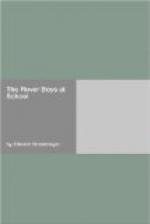Soon a fire was blazing merrily. They built it under the outer end of a long tree limb, and from the limb suspended a pot full of water by a long iron chain they had brought along. As the ground was covered with snow, there was little danger of spreading a conflagration. Soon the water was boiling and the guide made a steaming pot of coffee, which was passed around in tin cups, with sugar and a little condensed milk. They had brought along bread, cheese, chipped beef, and boiled eggs, and also a mince pie which Mrs. Barrow had baked the day before, and these made what Tom declared was a famous dinner.
“No sauce like hunger sauce,” laughed John Barrow, as he saw the lads stow the food away. “Once I was trampin’ the mountains all day without a mouthful when I chanced to look in a corner o’ my game bag and found a slice o’ bread, at least two weeks old. I ate that bread up, hard as it was, and nuthin’ ever tasted sweeter.”
“You’re right,” returned Dick. “The folks in the city who don’t know what to get to tickle their appetite ought to go hungry a few times. Then I’m sure they’d appreciate what they got.”
The midday meal finished, they lost no time in repacking the sled load and starting up the river once more. The stream was now wider than before, and presently spread out into a small lake.
“This is known as Tillard’s Pond,” said John Barrow. “Feller named Gus Tillard built his cabin over yonder, about ten years ago. He went out bar-huntin’ one day, and Mr. Bar came along and chewed him up.”
“Gracious! Then there must be pretty ugly customers in this vicinity,” exclaimed Sam, with a shiver.
“Not so many as there used to be. After Tillard’s death the boys over to the Run organized a b’ar hunt, and we brought in six o’ the critters Reckon thet scart the others—leas’wise no b’ars showed up fer a long while after.”
Out on Tillard’s Pond a stiff breeze was blowing, and consequently their progress was not as rapid as it had been, nor were any of them as warm as formerly.
“We’re going to have a cold first night, I can tell you that,” said Dick, and his prediction proved true. By the time the sun sank to rest behind the mountain in the west it was “snapping cold,” as Tom expressed it. The wind increased until to go forward was almost impossible.
“I know a pretty good place to rest in,” said the guide. “It isn’t over quarter of a mile from here. If we can make that we’ll be all right till mornin’.”
John Barrow led the way, pulling one of the sleds, and the boys followed. Poor Sam was getting winded and skated only with the greatest of difficulty.
It was dark when they reached the location the guide had in mind—a rocky wall on one side of the river. At one point there was a split in the rocks. This was overgrown at the top with cedars and brushwood, forming something of a cave, ten or twelve feet wide and twice as deep, the bottom of which was of rock and fairly smooth.




